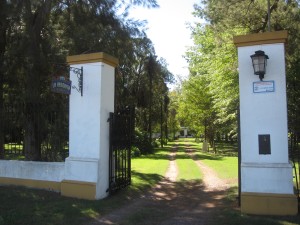Though I’m living in Buenos Aires, I realize that, of course, there’s so much more to Argentina than just city life. A country like Argentina, much like the US, is large and offers all types of different ways of living from the urban to the suburban to the rural. Because of Las Pampas (the farm country outside of BA), Argentina, justifiably, is world-renowned for its farmland and the farms that grow and raise everything from fruit and vegetables to grains to corn to cattle to sheep to wine to olive oil among many other typical products. Recently, I took a trip out to the pampas to spend a few days in the farmland and its small towns to experience a little of life in the outskirts of BA. While running the dirt roads out there, admiring all of the land, I got to thinking about exactly how you would say the word “farm” in Spanish. Well, after talking to some Argentines and doing some research of my own, I realized that the answer just isn’t nearly as simple as I thought.
Firstly, this past weekend, I took a trip to what in the US may be called a “farm” or “ranch” but here in Argentina is known as una estancia. I’ll write my rincón cultural tomorrow on it and the experience itself. In Spain una estancia is a “stay”, in the sense of “How was your stay? (in a hotel or something) or “I hope you enjoyed your stay”. Here in Argentina a “stay” is known as una estadia. Una estancia, on the other hand, here is a type of “ranch” or “farm” or even “country estate” where gauchos in Las Pampas or others raise cattle, horses and livestock, farm or live a tranquil, slow-paced life. In other Spanish-speaking countries this may be known as una hacienda or un rancho. Indeed, nowadays, as you’ll see in my other post, though many maintain their history as a working farm/ranch, many have also become a big tourist business and offer refurbished rooms in farm buildings, meals and an introduction to the rural, gaucho Argentine lifestyle in a relaxed setting. Many, too, offer what’s known as a Día de Campo, which is a day with lunch, horseback riding, gaucho shows, etc. without the overnight stays. They’re really popular if you don’t want to stay overnight.
Anyway, the actual word for “farm” can be tricky down here. The most common word, particularly for a small farm here is una chacra. It’s a word that comes from the Incan quechua native language. Una granja, however, is used here, too, and seems to be more common throughout the Spanish-speaking world though gives the sense of a much bigger land area, I think. A farm might also be known simply as un campo. In addition, in the Spanish-speaking world, they also use, and may understand here una finca, un cortijo or, as I recall in Chile, un fundo (though that might be more like una estancia… not sure). Not to be outdone, a “dairy farm”, you know, for milking cows, making cheese, etc. has an altogether DIFFERENT name here in Argentina – un tambo. I’m sure there are more and if you’d like I can look them up for you. Didn’t think so. 🙂

Prof Rabner



One Response to “El rincón idiomático – Down on the farm”